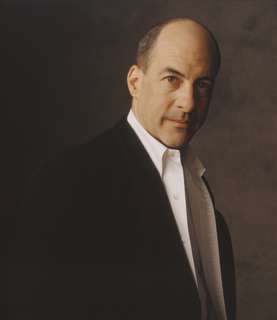|
Back
Nights in the Gardens of Nightingales New York
Stern Auditorium, Carnegie Hall
11/07/2009 -
Angel Lam: Awakening from a Disappearing Garden, for Cello and Orchestra (New York Premiere, commissioned by Carnegie Hall)
Igor Stravinsky: Solovej (The Nightingale)
Yo-Yo Ma (Cellist), Celena Shafer (Nightingale), Jessica Rivera (Cook), Irina Tchistjakova (Death), Thomas Glenn (Fisherman), Kostas Smorigninas (Emperor), Jason Grant (Bonze), Denis Sedov (Chamberlain)
Atlanta Symphony Chamber Chorus, Norman Mackenzie (Director), Atlanta Symphony Orchestra, Robert Spano (Music Director and Conductor)

R. Spano (© Andrew Eccles)
Has Carnegie Hall run out of music?? Don’t answer this seriously. As their “Ancient Paths/Modern Voices” weeks of Chinese and China-inspired music come to an end, only the top of Chinese talent and historical chinoisierie has been skimmed. Yet within 48 hours, two visiting orchestras have stepped on each other's talons, so to speak, playing Igor Stravinsky’s non-Fire bird, the nightingale, twice in 72 hours.
Still, that rara avis, as orchestral suite and as opera, couldn’t have been more dissimilar. That ever hardheaded Mr. Stravinsky, realizing that his 45-minute opera, composed over 15 years, was attracting few stagings (nobody knew what to pair it with), arranged a suite using virtually all the orchestral music.
Without knowing the story, the suite was pure energy, orchestral fireworks and, under David Robertson’s baton Wednesday evening, it exploded through the Stern Auditorium.
Last night, the full Solovej was semi-staged by the Atlanta Symphony Orchestra under Robert Spano, and some marvelous singers. It is still a magical score, its titular character has a part to rival the Queen of the Night, and the Danish-Chinese fairy glitters with Russian thaumaturgy.
While Mr. Spano deserted the Brooklyn Philharmonic for the magnolias of Atlanta, he has assiduously improved Robert Shaw’s Atlanta Symphony Orchestra. Their soloists and ensemble were spot-on with this difficult score. In Celena Shafer, they had a Nightingale who not only flew to the highest notes with limpid ease, but danced the role, as flirt, courtesan and, yes, a bird. The others were all in good shape, and the chorus–another inheritance of Robert Shaw–played their multiple roles with expected aplomb. (The actual Greek “chorus” was the Fisherman, a philosophical Thomas Glenn.)
My only hesitation was in the mixture of staging and orchestra. The singers acted their parts on the rim of the stage: Nightingale flew around, Emperor pompously sat, other courtiers were costumed, the birdcage was real. But so delicate is this opera that when the major prop is the massive Atlanta Symphony, then the gossamer delicacy is somehow challenged.
The scale–balancing song, wit, and dance with 100-plus prominent instruments–was a bit disconcerting. But it was still a gorgeous effort with the kind of luscious score which the composer deserted a few years later.
The opener was a new cello concerto by Hong Kong-American composer Angel Lam, played by no less than Yo-Yo Ma and narrated by the composer herself. Ms. Lam’s two narrations were intertangled short stories about two women, and they both were obviously dreams. (I thought immediately of Robert Altman’s dream movie, 3 Women.)
The music which followed each reading started with some beautiful, pulsing melodic feeling, partly California, partly Samuel Barber, but with the same honesty as Ms. Lam’s poem-stories. The second reading took place in an imagined Shanghai, and the music became very Chinese indeed, with the usual gongs, bells and schmaltzy string lines. Mr. Ma is a great admirer of Ms. Lam, and his cello part, starting with some lovely meanderings, developed into a fantastic cadenza, accompanied by bass drum pounding.
Nothing was contrived here, it was an honest and attractive concerto from a woman who has talent to spare and a long life to develop her inspiration.
By the way, the audience was a bit confused by the last measure, when the orchestra stood up, faced the audience and shouted out “Wei Wu!” Taoist scholars in Carnegie Hall immediately knew that this ancient phrase means “action by inaction.” Non scholars were still suitably impressed, giving Messrs Lam, Ma and Spano a standing ovation.
Harry Rolnick
|